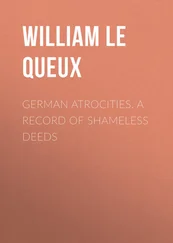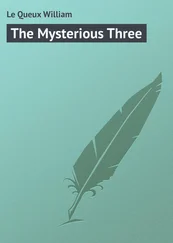William Le Queux - Whither Thou Goest
Здесь есть возможность читать онлайн «William Le Queux - Whither Thou Goest» — ознакомительный отрывок электронной книги совершенно бесплатно, а после прочтения отрывка купить полную версию. В некоторых случаях можно слушать аудио, скачать через торрент в формате fb2 и присутствует краткое содержание. Жанр: foreign_prose, на английском языке. Описание произведения, (предисловие) а так же отзывы посетителей доступны на портале библиотеки ЛибКат.
- Название:Whither Thou Goest
- Автор:
- Жанр:
- Год:неизвестен
- ISBN:нет данных
- Рейтинг книги:5 / 5. Голосов: 1
-
Избранное:Добавить в избранное
- Отзывы:
-
Ваша оценка:
- 100
- 1
- 2
- 3
- 4
- 5
Whither Thou Goest: краткое содержание, описание и аннотация
Предлагаем к чтению аннотацию, описание, краткое содержание или предисловие (зависит от того, что написал сам автор книги «Whither Thou Goest»). Если вы не нашли необходимую информацию о книге — напишите в комментариях, мы постараемся отыскать её.
Whither Thou Goest — читать онлайн ознакомительный отрывок
Ниже представлен текст книги, разбитый по страницам. Система сохранения места последней прочитанной страницы, позволяет с удобством читать онлайн бесплатно книгу «Whither Thou Goest», без необходимости каждый раз заново искать на чём Вы остановились. Поставьте закладку, и сможете в любой момент перейти на страницу, на которой закончили чтение.
Интервал:
Закладка:
“And they will kill you while you are doing it, or after you have done it,” said Farquhar grimly.
“You do not pay a very high compliment to my intelligence, my friend. I think I may say that I am clever. Anarchists are very stupid people. They will suspect each other long before they suspect Andres Moreno.”
He was a small man, but he looked quite important as he made this boast. Whatever his failings, a want of confidence in himself was not one of them. But Farquhar still appeared dubious.
“I was a little doubtful till last night when I saw your friends at the restaurant,” went on Moreno, in his slightly husky voice. “You did not introduce me, there was no opportunity for that. I recognised one of them, Guy Rossett, who, I take it, is the fiancé of that charming young lady who, you say, is your cousin.”
Farquhar frowned a little. How quick these foreigners were to guess things.
“I have no idea,” he said stiffly. “General Clandon is my uncle, and I have been on very intimate terms with him and his family since I was a child. If there were any engagement, I think I should have been informed.”
Moreno noticed the frown, the stiffness in the tone. He went on smoothly.
“I may be jumping at conclusions rather too hastily, but I will tell you how I arrived at them. I happen to know that Guy Rossett is appointed to the Embassy at Madrid. With his sister, he dines with this charming girl and a man, obviously her father. It looks to me like a farewell dinner, and at a restaurant which is excellent, but certainly not fashionable. They wanted to escape observation, otherwise a man in Rossett’s position, and he was certainly the host, would have been at the Ritz.”
“And what do you deduce from these profound observations, worthy of Sherlock Holmes himself?” asked Farquhar a little testily.
Moreno answered slowly. He could see that his friend was troubled, but he had gone too far to recede.
“I should say there was a secret understanding between the young people, approved of by the girl’s father, and the man’s sister. Probably they are still waiting for the Earl’s consent to an open engagement.”
Farquhar, to hide his agitation, swallowed his whiskey and soda in one draught, and chewed viciously at the end of his cigar.
“You may be right,” he said, speaking with forced calm. “Well, let us get back to your anarchists. What has made you join them?”
Moreno reflected a moment before he spoke.
“I happen to know that young Rossett was in possession of some very exclusive information about this particular plot. That is one of the reasons why he has been sent to Spain.”
“And where do you come in?” questioned Farquhar.
Moreno smiled. “It is as much curiosity as anything. The anarchists know that Rossett knows a good deal about them. Now, I want to find out how they are going to act when Rossett finds himself in Madrid, you see.”
“And you’ll find it out before you are many hours older, cunning old devil that you are,” said Farquhar, with an appreciative smile. “Well, let me know how you get on. Isobel Clandon is my cousin, and I can’t help feeling interested in all this, especially if what you suggest about her and Rossett is true.”
When Moreno had left, the ambitious young barrister sat thinking deeply. He had loved his cousin for years, not perhaps with any great overmastering passion, but with that steady affection which might be expected from a man of his grave and cautious temperament.
He was prepared to speak when the time was ripe, when his prospects and circumstances permitted him to offer Isobel a proper home. Moreno’s words troubled him, and he had an uneasy suspicion that the Spaniard, with his swift intelligence, had accurately gauged the situation. The fruit which might have been his for the mere stretching out of the hand – had it been plucked by somebody more impetuous, more energetic than himself?
This he must learn as soon as possible. Moreno’s words had suddenly roused him to action. He was now blaming in his mind, those very traits on which he had been wont to pride himself, his scrupulousness, his excessive caution.
He had always thought that Isobel liked him, that she would not be reluctant to entertain his advances, when he had judged the time was right to make them.
And, of course, he had been a fool. He had not looked at the position from the girl’s point of view. A girl, however much she may be inclined towards a man, is not disposed to wait indefinitely while he is making up his mind, nicely balancing pros and cons.
He had never thought of anybody else for his wife. But he had reckoned too surely on the fact that she was waiting quietly in that little home at Eastbourne, till he chose to make love to her.
He wired to General Clandon the next morning, explaining that he had a couple of days’ leisure; might he run down? There came back the cordial reply, “Come at once. Delighted.”
Truth to tell, the General was both proud and fond of his nephew, the son of his favourite sister. He might have thought at times that the young man was a little too grave and serious for his years, he had always seemed singularly free from the follies of youth. But he had the greatest respect for his sterling qualities, for his high principles and character.
Father and daughter met him at the station. Isobel liked him very much. There was a time when liking might have been converted into a warmer feeling. But, speaking in vulgar parlance, Maurice had failed through his over-scrupulousness, his too nice weighing of possibilities and probabilities, to strike while the iron was hot.
And then Guy Rossett, ardent, impetuous, the beau idéal of a lover, had carried her off her feet, and her cousin was hardly a memory, so much did she live in the radiance of the present.
He had a most dainty dinner. Isobel was a wonderful housekeeper, and could accomplish wonders on a very limited income. Maurice, his desire sharpened by his forebodings, thought what a perfect wife she would make, uniting the decorative with the practical.
After dinner she left the men alone to their wine and cigars. Farquhar was not long in coming to the point. It was typical of his rather staid and old-fashioned way of regarding things that, even in the delicate matter of love, the correct method was to approach the parent first.
“I wonder, uncle, if you have ever thought of me in the light of a future son-in-law?”
The General looked a little embarrassed. Not very long ago, that aspect of his nephew had presented itself to him, and the prospect was not unpleasing. He had a shrewd notion that Maurice was very attached to his pretty cousin, and was marking time for some quite honourable and justifiable reasons.
Of Isobel he was not at all sure. Maurice had every good quality from a man’s point of view, but he was not quite the stuff out of which romantic and compelling lovers are made. And her father was certain that Isobel was full of romance.
The General answered slowly, and with a caution worthy of Maurice himself. “I might have thought about it some time ago, my boy. I fancied then that you were greatly attached. Let me see, it was some three or four years ago that I formed that opinion, I think.”
“Yes,” said Maurice, speaking with a quiet bitterness. “I suppose it was about then that I showed my feelings, as far as I am capable of showing them, plainly. But there were reasons why I did not speak then, reasons that I still think good ones.”
“I am sure of that, my dear boy,” said the uncle kindly. He guessed now the reason of this visit, that sudden telegram.
“At that time I was making headway, it is true, but my position was by no means assured. You know the smallness of my patrimony, and what I earned outside was inconsiderable. I did not feel justified in asking a girl to wait, on the chance of prospects that might never come to fruition.”
Читать дальшеИнтервал:
Закладка:
Похожие книги на «Whither Thou Goest»
Представляем Вашему вниманию похожие книги на «Whither Thou Goest» списком для выбора. Мы отобрали схожую по названию и смыслу литературу в надежде предоставить читателям больше вариантов отыскать новые, интересные, ещё непрочитанные произведения.
Обсуждение, отзывы о книге «Whither Thou Goest» и просто собственные мнения читателей. Оставьте ваши комментарии, напишите, что Вы думаете о произведении, его смысле или главных героях. Укажите что конкретно понравилось, а что нет, и почему Вы так считаете.












